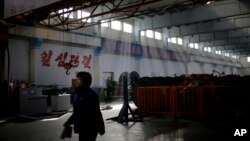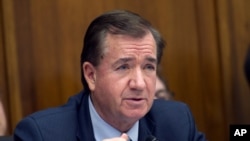While the Donald Trump administration is reportedly reviewing the current U.S. policy on North Korea, some U.S. lawmakers and experts are calling for increased sanctions on the isolated state.
Since early 2015, the United States has been escalating pressure on the North by targeting certain individuals and entities. Despite the enhanced effort to choke off Pyongyang’s revenue streams, the Kim Jong Un regime continues on its path toward acquiring functional nuclear weapons that could strike the U.S. mainland. In 2016, the country conducted two nuclear tests and more than 20 ballistic missile tests.
During a House Foreign Affairs Committee hearing on North Korea this week, U.S. Rep. Ed Royce, R-California, stressed the need for additional sanctions.
“There are other steps that can be taken to crack down on the Kim regime,” the committee’s chair said in a prepared statement.
Anthony Ruggiero, a North Korea expert in the use of targeted financial measures who spent more than 17 years in the U.S. government, told VOA the failure to thwart North Korea’s nuclear program can be attributed to existing sanctions that aim at the wrong targets. Ruggiero suggested the U.S. should reorient the focus of North Korea sanctions.
New targets
“I think that North Korea is vulnerable to sanctions if they are done in the right way,” said Ruggiero, who is now a senior fellow at the Foundation for Defense of Democracies in Washington, D.C.
According to Ruggiero, designations have doubled under the previous administration, with the designated parties mostly being “people located inside North Korea.” Instead, the U.S. should, he said, pursue North Korea’s offshore front companies, whether they be in China or elsewhere, that facilitate the Kim regime’s nuclear development.
Ruggiero added that it is crucial to introduce additional sanctions, including restricting tourist travel to North Korea.
“I think that’s a dangerous area that provides hard currency to the regime but also puts Americans at risk,” he said.
The North is known to hold two U.S. nationals, and the U.S. State Department issues travel warnings about the communist country every 90 days.
Joshua Stanton, a Washington, D.C.-based attorney who also maintains the influential One Free Korea blog, called on the Trump administration to impose secondary sanctions on third parties that take part in North Korean financial activities, namely Chinese companies and financial institutions.
Secondary boycott
“We need to do a much better job of first, devoting sufficient resources to finding out where North Korea’s money laundering is going through, and second, we have to have the political will to sanction, to designate, to freeze the assets of companies and banks in third countries, including China, that are helping North Korea violate the sanctions,” the lawyer said in an interview.
Stanton claims that getting the sanctions to work quickly might be the only alternative to military action.
“We have lost too much [time] and if sanctions don’t work, I am afraid that the president will decide that to protect the American people, the only alternative is a preemptive strike,” he said.
Some argue the full implementation of existing sanctions is more important than imposing additional sanctions.
“The U.S. has substantial sanctions against North Korea as it is. I don’t think it’s really a question of the U.S. adding new measures,” Daniel Glaser, who served as assistant secretary for terrorist financing at the U.S. Treasury Department in the Obama administration, told VOA.
Glaser, a 20-year veteran of the Treasury Department, added that new measures are not going to have a substantial impact on the North at this point, “unless the [sanctions] are vigorously enforced across the borders throughout the international financial system.”
Enforcing sanctions
Joseph DeThomas, who has spent 32 years in the U.S. State Department serving in various positions that dealt with North Korea, told the VOA the first step forward is to get the U.N. sanctions fully and completely enforced throughout the world.
“We have very little to sanction North Korea. But we have to influence other countries to behave first according to the existing U.N. sanctions, which are relatively tough now,” said DeThomas, who is now an international affairs professor at Penn State University.
Critics, however, question the effect of sanctions, citing the difficulty of implementing them.
“I would argue that the biggest challenge with the current sanctions against North Korea is the difficulties with effectively enforcing them,” said Dursun Peksen, an associate professor of political science at the University of Memphis, in an email message sent to VOA.
Peksen suggested the U.S. and allies should “come up with more sophisticated enforcement mechanisms such as stricter border controls and procedures” to ensure China and others do not engage in “sanction-busting” through overt or clandestine economic exchanges with North Korea.










